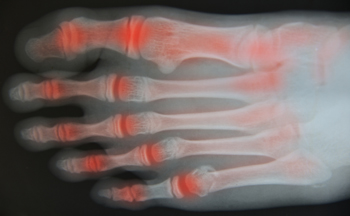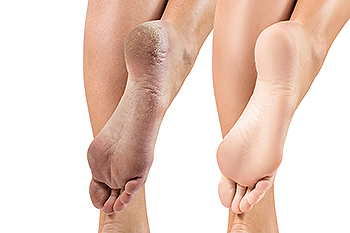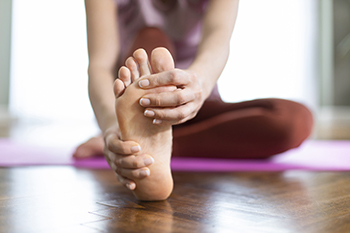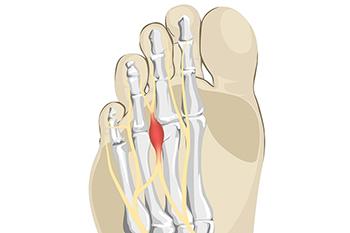Items filtered by date: March 2023
Various Forms of Arthritis

There are several joints, tendons, and muscles that are found in each foot. When arthritis in the foot develops, it can affect mobility and the range of motion may be reduced. Common symptoms of arthritic feet can consist of swelling, pain, stiffness, and in severe cases, the joints may become deformed. There are three main types of arthritis that can affect the feet. One type is osteoarthritis (OA), which is gradual wear and tear as the aging process occurs. Rheumatoid arthritis (RA) is considered to be an autoimmune disease and is often accompanied by inflammation. It may cause the foot to eventually lose function. If an injury happens to the foot, post-traumatic arthritis may occur and can affect the cartilage between the joints. Arthritis may affect balance in the feet, possibly causing the patient to become unsteady. Managing arthritic feet may be done by engaging in low-impact activity, maintaining a moderate weight, and eating healthy foods. If you have foot pain, it is strongly suggested that you speak with a podiatrist who can properly diagnose arthritis and offer the correct treatment solutions.
Arthritis can be a difficult condition to live with. If you are seeking treatment, contact Gary J. Kaiserman, DPM from Achilles Footcare Center. Our doctor can provide the care you need to keep you pain-free and on your feet.
Arthritic Foot Care
Arthritis is a joint disorder that involves the inflammation of different joints in your body, such as those in your feet. Arthritis is often caused by a degenerative joint disease and causes mild to severe pain in all affected areas. In addition to this, swelling and stiffness in the affected joints can also be a common symptom of arthritis.
In many cases, wearing ill-fitting shoes can worsen the effects and pain of arthritis. Wearing shoes that have a lower heel and extra room can help your feet feel more comfortable. In cases of rheumatoid arthritis, the arch in your foot may become problematic. Buying shoes with proper arch support that contour to your feet can help immensely.
Alleviating Arthritic Pain
- Exercises that stretch the foot can prevent further pain and injury and increase mobility
- Most of the pain can be alleviated with anti-inflammatory drugs, heat, and topical medications
- Massages can help temporarily alleviate pain.
It is best to see your doctor for the treatment that is right for your needs and symptoms. Conditions vary, and a podiatrist can help you determine the right method of care for your feet.
If you have any questions, please feel free to contact our offices located in Forest Lane and West Kiest Boulevard Dallas, TX . We offer the newest diagnostic tools and technology to treat your foot and ankle needs.
How to Handle Dry Cracked Feet

Dry cracked feet are common for many people. Dry skin, or xerosis, comes from a lack of moisture in the skin. It can be a cosmetic problem or an underlying health condition. Itchiness, rash, pain, and even infections can be a result of dry skin. Cracked skin on the feet can be from calluses on the heels or soles of the feet. This can happen from environmental factors, such as temperature or soaps used. It can happen from skin afflictions, like athlete’s foot or psoriasis. It can come from medical conditions or nutritional deficiencies, including diabetes, hypothyroidism, or malnutrition. Cracked feet can also come from aging. As one ages, changes in hormones and metabolism lead to the body replacing skin cells less frequently, the outer skin layer becoming thicker, and the protective fat pad on the sole becoming thinner. The skin on the feet becomes more stressed leading to cracked and calloused skin. If you suffer from dry, cracked feet and additional moisturizing does not help or an infection seems to be brewing, it is suggested that you consider seeing a podiatrist for additional help.
If the skin on your feet starts to crack, you may want to see a podiatrist to find treatment. If you have any concerns, contact Gary J. Kaiserman, DPM from Achilles Footcare Center. Our doctor can provide the care you need to keep you pain-free and on your feet.
Cracked Heels
It is important to moisturize your cracked heels in order to prevent pain, bleeding, and infection. The reason cracked heels form is because the skin on the foot is too dry to support the immense pressure placed on them. When the foot expands, the dry skin on the foot begins to split.
Ways to Help Heal Them
- Invest in a good foot cream
- Try Using Petroleum Jelly
- Ease up on Soaps
- Drink Plenty of Water
Ways to Prevent Cracked Heels
- Moisturize After Showering
- Skip a Shower
- Keep Shower Water Lukewarm
- Don’t Scrub Your Feet
If you are unsure how to proceed in treating cracked heels, seek guidance from a podiatrist. Your doctor will help you with any questions or information you may need.
If you have any questions, please feel free to contact our offices located in Forest Lane and West Kiest Boulevard Dallas, TX . We offer the newest diagnostic and treatment technologies for all your foot care needs.
Gout Pain Can Be Managed
Toe Pain and Capsulitis

No one likes toe pain. Even though the toes are small parts of the body, experiencing toe pain is no joke. There are many different potential sources of toe pain. Capsulitis is one interesting type of foot condition that almost exclusively affects the foot's second toe. The condition occurs when the ligament structure at the joint of the second toe becomes significantly inflamed. As a result of this condition, an individual might experience any number of symptoms. Most importantly, a patient with capsulitis can experience pain in the ball of the foot under the affected toe, usually the second toe. It is important to note that capsulitis can sometimes, although rarely, impact the third toe. If you struggle with toe pain, it is highly recommended that you contact a podiatrist today for treatment.
Toe pain can disrupt your daily activities. If you have any concerns, contact Gary J. Kaiserman, DPM of Achilles Footcare Center. Our doctor can provide the care you need to keep you pain-free and on your feet.
What Causes Toe Pain?
Most severe toe pain is caused due to a sports injury, trauma from dropping something heavy on the toe, or bumping into something rigid. Other problems can develop over time for various reasons.
Toe pain can be caused by one or more ailments. The most common include:
- Trauma
- Sports injury
- Wearing shoes that are too tight
- Arthritis
- Gout
- Corns and calluses
- Hammertoe
- Bunions
- Blisters
- Ingrown toenails
- Sprains
- Fractures (broken bones)
- Dislocations
When to See a Podiatrist
- Severe pain
- Persistent pain that lasts more than a week
- Signs of infection
- Continued swelling
- Pain that prevents walking
Diagnosis
In many cases the cause of toe pain is obvious, but in others, a podiatrist may want to use more advanced methods to determine the problem. These can range from simple visual inspections and sensation tests to X-rays and MRI scans. Prior medical history, family medical history, and any recent physical traumatic events will all be taken into consideration for a proper diagnosis.
Treatment
Treatments for toe pain and injuries vary and may include shoe inserts, padding, taping, medicines, injections, and in some cases, surgery. If you believe that you have broken a toe, please see a podiatrist as soon as possible.
If you have any questions please feel free to contact our offices located in Forest Lane and West Kiest Boulevard Dallas, TX . We offer the newest diagnostic tools and technology to treat your foot and ankle needs.
Leading Cause of Morton’s Neuroma

Morton’s neuroma is a condition that involves the feet. The medical name for this is known as Morton’s metatarsalgia or interdigital neuroma, and it affects the nerve between the third and fourth toes. Wearing high heels that do not have adequate room in the toe area is the leading cause of Morton’s neuroma. Wearing these types of shoes may cause this nerve to become compressed and is often painful and uncomfortable. Additionally, it may happen to patients who frequently participate in running and jumping activities, or to people who have flat feet or high arches. Common symptoms that are associated with this condition can include a tingling sensation that may eventually become a sharp and shooting pain. Numbness can accompany this ailment, and relief may be found when looser shoes are worn. If you have this type of pain, it is suggested that you contact a podiatrist who can provide treatment options, which may include wearing custom-made orthotics.
Morton’s neuroma is a very uncomfortable condition to live with. If you think you have Morton’s neuroma, contact Gary J. Kaiserman, DPM of Achilles Footcare Center. Our doctor will attend to all of your foot care needs and answer any of your related questions.
Morton’s Neuroma
Morton's neuroma is a painful foot condition that commonly affects the areas between the second and third or third and fourth toe, although other areas of the foot are also susceptible. Morton’s neuroma is caused by an inflamed nerve in the foot that is being squeezed and aggravated by surrounding bones.
What Increases the Chances of Having Morton’s Neuroma?
- Ill-fitting high heels or shoes that add pressure to the toe or foot
- Jogging, running or any sport that involves constant impact to the foot
- Flat feet, bunions, and any other foot deformities
Morton’s neuroma is a very treatable condition. Orthotics and shoe inserts can often be used to alleviate the pain on the forefront of the feet. In more severe cases, corticosteroids can also be prescribed. In order to figure out the best treatment for your neuroma, it’s recommended to seek the care of a podiatrist who can diagnose your condition and provide different treatment options.
If you have any questions, please feel free to contact our offices located in Forest Lane and West Kiest Boulevard Dallas, TX . We offer the newest diagnostic and treatment technologies for all your foot care needs.

